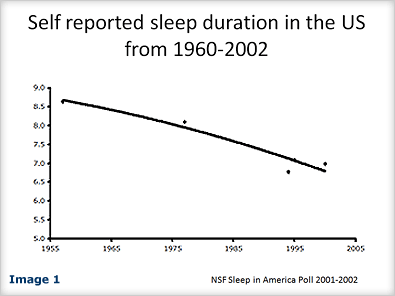A question I get asked frequently: “I’m eating a Paleo diet but I’m not losing weight. Why?” Sometimes the person lost a bunch of weight initially but plateaued far from their goal (>30 pounds, so not vanity weight). Sometimes the person started Paleo with the hopes of losing weight and didn’t experience any weight loss (or even experienced weight gain). When we’re surrounded by thousands of inspiring success stories, this is [expletive deleted] frustrating.
I always answer this question with another question. And it might surprise you to know what the very first thing I ask is. I ask: “How’s your sleep?”.
Yes, this is where I start troubleshooting a resistance to weight loss. It’s not the only possible culprit (other common ones include high stress, undiagnosed autoimmune disease, adrenal fatigue, micronutrient deficiencies, overeating calorie-dense foods like nuts, and undereating calories)–but in my experience, inadequate sleep is the most common reason (or at least major contributor to) why people with weight to lose and eating a Paleo diet aren’t seeing success.
In fact, medical research shows that there’s a stronger connection between obesity and lack of sleep than any diet factor. Or rather, that lack of sleep affects diet so profoundly that even though we gain weight as a result of what we’re eating, the root cause is not getting enough sleep.
Save 80% Off the Foundations of Health
Expand your health knowledge on a wide range of topics relevant to you, from how to evaluate scientific studies, to therapeutic diet and lifestyle, to leaky gut and gut microbiome health, to sustainable weight loss, and much more!!!

How Sleep Affects The Brain
Let’s take a step backward. Why is sleep even important? The reason why we even need sleep is a question that evaded scientific researchers until very recently! But, we now know that the main purpose of sleep is to allow for detoxification processes in the brain.
When our cells use energy, they produce waste. This waste is made up of a variety of chemicals, many toxic, that are the byproducts of cellular metabolism. Normally, this waste enters the bloodstream and it’s part of the liver and kidney’s jobs to filter this waste and make sure it’s eliminated from the body via urine and stool.
The brain uses about 20% to 25% of the total calories we burn every day. Yes, the brain needs a lot of energy to perform all the wondrous functions it performs. And this means a large accumulation of metabolic byproducts concentrated in one, comparatively small, organ. And to flush these waste products out of our brains, we need to sleep. During sleep, brain cells shrink by 60%, increasing the space between them so the toxins that build up during the day can be flushed away more effectively. Yes, sleep is absolutely critical to remove these toxic compounds from brain and out into the bloodstream (and to the liver and kidney, so they can then do their job).
Without sufficient sleep, these toxic metabolic byproducts build up in your brain. This can then negatively impact cellular health, neurotransmitter systems, hormone systems, communication between neurons, and stimulate inflammation in the brain. And anything that impacts the health of the brain, impacts every other system in the human body. This is likely why inadequate sleep has been linked to so many health conditions and broader issues like immune system dysfunction and hormone dysregulation. In fact, inadequate sleep increases your risk of dying from all causes. And of course, chronically getting insufficient sleep is linked to obesity. And it’s not a question of being someone who gets only a few hours of sleep each night, or who pulls all-nighters semi-regularly. This doesn’t just affect shift workers or those with insomnia or infants getting them up every few hours. Even just shortchanging yourself by an hour every night has an effect that builds up over time. If you need an alarm clock to wake yourself up in the morning, you aren’t getting enough sleep.
And it’s not a question of being someone who gets only a few hours of sleep each night, or who pulls all-nighters semi-regularly. This doesn’t just affect shift workers or those with insomnia or infants getting them up every few hours. Even just shortchanging yourself by an hour every night has an effect that builds up over time. If you need an alarm clock to wake yourself up in the morning, you aren’t getting enough sleep.
Sleep and Obesity-The Hormone Link
It is well-established in the scientific literature that routinely not getting enough sleep dramatically increases risk of obesity. One mechanism by witch inadequate sleep increases your risk of weight gain and obesity is its profound effects on hunger hormones and metabolism.
Not getting enough sleep, increases appetite. When food intake is measured following sleep deprivation (five consecutive days of 4 hours’ sleep), people tend to eat substantially more than normal (20% more!!!!). However, it doesn’t take five full days of inadequate sleep to see huge shifts in insulin, cortisol, and leptin, which all impact appetite as well as metabolism (see The Hormones of Hunger and The Hormones of Fat: Leptin and Insulin for more). One study showed that even a single night of partial sleep (4 hours, something many of us experience more often than we’d like) causes insulin resistance in healthy people. Another study showed that a single night of partial sleep (3 hours in this case) caused a classic pattern of dysregulated cortisol, with lower morning cortisol levels (when cortisol should be at its highest), higher afternoon and evening cortisol levels (when cortisol should be waning), and high morning leptin levels. This means that one night of 3 or 4 hours’ sleep causes insulin resistance, dysregulated cortisol, and increased leptin–all hormonal situations that lead to weight gain. That’s one night of staying up past your bedtime because you went to a late movie or a party at the boss’s house. One.
Through these hormonal effects, not getting enough sleep alters food preferences (towards more energy-dense foods), increases hunger, decreases fat metabolism, and increases the stress response which affects basal metabolic rate.
Sleep and Obesity-The Dopamine Link
But, there’s a whole lot more to the link between sleep and obesity. And the dopamine link is perhaps even more impactful.
Dopamine is a neurotransmitter (and yes, also technically a hormone, but I’m separating it out from the other hormones because they are also neurotransmitters). It plays important roles in motor control, motivation, arousal, cognition, and reward, as well as a number of basic lower-level functions including lactation, sexual gratification, and nausea. But in order to perform its functions, dopamine must bind to a receptor, so its efficacy is only as good as both its levels and the levels of its receptors. In addition, receptors can be more or less sensitive to dopamine, adding another layer of complication to understanding how this system impacts our health.
 There’s a huge body of scientific literature showing that people with obesity and/or binge-eating disorder (those are not the same thing and do not necessarily go together) have the same type of changes in dopamine receptors in the brain as drug addicts. In particular, the dopamine system in a region of the brain called the striatum–which is involved in reward, motivation, and food consumption–is altered in obesity. Food addiction is a real thing.
There’s a huge body of scientific literature showing that people with obesity and/or binge-eating disorder (those are not the same thing and do not necessarily go together) have the same type of changes in dopamine receptors in the brain as drug addicts. In particular, the dopamine system in a region of the brain called the striatum–which is involved in reward, motivation, and food consumption–is altered in obesity. Food addiction is a real thing.
It’s thought that food addiction arises from opportunistic overconsumption of highly palatable foods. This then triggers neuroadaptive response in the brain reward circuits, completely analogous to drug and alcohol addiction, which then drives the development of compulsive eating. This change in dopamine and its receptors increases our incentive to eat while counteracting the satiety signals, which leads to overeating.
New research adds to our understanding of food addiction in a very important way. Opportunistic eating behavior and body-mass-index (BMI) were both positively associated with something called dopamine D2-like receptor binding potential (how readily D2 dopamine receptors bind to dopamine) in a particular part of the striatum but they were negatively associated in the rest of the striatum. This pattern suggest that obese people have alterations in dopamine neurocircuitry that may increase their susceptibility to opportunistic overeating while at the same time making food intake less rewarding, less goal directed and more habitual.
You would think that food addiction means that we get an exaggerated reward response to food, but actually, it’s the opposite!!!! So, in addition to a compulsion to eat, those of us with a history of obesity find eating to be less fulfilling and we get less enjoyment from food. We eat because it’s a habit to eat. That also means that we’re compelled to eat more in order to feel satisfied. You’re probably thinking the same I am: “or for [expletive deleted] sake”.
It’s believed that this change in dopamine receptors characteristic of food addiction and so common in those of us with a history of obesity and/or binge eating disorder is caused by opportunistic overeating. Well, it turns out that this altered dopamine receptor pattern in the brain may also be caused by lack of sleep.
The study of how lack of sleep affects the brain is an entirely different field, but one that is still very relevant to obesity research. A recent study measured the effects on dopamine receptors in the striatum region of the brain in healthy volunteers deprived of sleep. The authors of this study were interested in discovering the biological mechanism responsible for the decreased alertness we experience after a night of lost sleep. So, they looked at both dopamine levels and the levels of dopamine receptors. Sleep deprivation caused no change in the levels of dopamine but a major decrease in dopamine receptors in the same part of the striatum region of the brain (ventral striatum) where dopamine receptors are decreased in those with obesity or binge-eating disorder, the part that mediates the reward response to food and motivation to eat.
What does this mean? From the perspective of simply understanding the effects of sleep on the brain, this means that sleep deprivation causes changes in the brain that make it less receptive to dopamine, so dopamine can’t do all the things that dopamine does. And this likely explains the reason for common sleep deprivation behaviors, like increases in risk taking behavior, impulsivity, and drug relapse (yes, addiction). The relevance to obesity is that these are the exact same changes in the brain seen in people who are obese or who have binge-eating disorder. Maybe it’s not opportunistic overeating that gets us to food addiction, but chronically not getting sufficient sleep. Or both.
Yes, those late night movies or study sessions are directly related to food addiction and impulsive eating behavior. And the more chronically you suffer from inadequate sleep, and the amount of sleep you’re short each night, directly impacts your ability to achieve and maintain a healthy weight.
Are genetics at play?
It turns out that there’s a couple of variants of the CLOCK gene, the family of genes that control circadian rhythms (how our bodies know what time of day it is) that may explain why inadequate sleep causes some people to dramatically gain weight but not others. When you have these particular CLOCK gene variants, you are much more susceptible to increased hunger and food cravings when you’re sleep deprived.
The study that discovered this genetic link looked at appetite stimulation and the hormonal effects of sleep deprivation. Because the dopamine receptor changes seen in the brain of sleep-deprived people was seen in all test subjects (who were also healthy individuals), it’s likely that the dopamine link between lack of sleep and obesity does not require a genetic predisposition (or at least, not the same genetic predisposition as the hormone link).
Most importantly, the simple act of routinely getting enough sleep, turns off the effects on hunger and food preferences caused by lack of sleep in people with these CLOCK gene variants. So, while genetics may make you more susceptible to gaining weight when you’re not getting enough sleep, the environmental factor (inadequate sleep) is critical for the effect. You aren’t doomed to being overweight, you just have to go to bed at a good time every night.
It’s also worth noting that genetics don’t seem to play a role in the other negative health impacts of sleep deprivation. So, even if you aren’t someone who put on the pounds when your sleep needs improvement, that doesn’t absolve you from the other ways lack of sleep is detrimental to your health.
Take-Home Message
It is no surprise then that the rise in obesity completely mirrors the decrease in average sleep over the last 50 years! Did you know that on average, we get 1.5 to 2 hours less sleep every night than we did 50 years ago? From what we know about how lack of sleep affects our brains, hormones, and immune system, this may be the single greatest contributor to chronic illness in general (that’s right, sleep, and not diet). How much sleep is enough to detoxify the brain and therefore prevent all the negative health impacts of inadequate sleep? A minimum number of hours has not been established. However, other studies put human sleep requirements at 7 to 10 hours every night. My suggestion is to aim for 7 hours of sleep every single night as a bare minimum. I believe even grown-ups need bedtimes. By making sure yours in early enough to hit 7 hours of sleep every night, you’ll be greatly improving your health and reducing risk of all chronic illnesses.
How much sleep is enough to detoxify the brain and therefore prevent all the negative health impacts of inadequate sleep? A minimum number of hours has not been established. However, other studies put human sleep requirements at 7 to 10 hours every night. My suggestion is to aim for 7 hours of sleep every single night as a bare minimum. I believe even grown-ups need bedtimes. By making sure yours in early enough to hit 7 hours of sleep every night, you’ll be greatly improving your health and reducing risk of all chronic illnesses.
Losing weight and maintaining weight loss is fantastically complex. A variety of hormones (like the aforementioned insulin, leptin, and cortisol, but also ghrelin, thyroid hormones, and sex hormones) all play a role in both weight loss and weight loss maintenance. Now, the addition of the dopamine system to our understanding of weight control is adding yet another obstacle to overcome: brain chemistry.
Lack of sleep and a history of food addiction means that some of us are hardwired to overeat. Our brains will tell us to “eat more” long after we’ve actually eaten enough. This means that one piece of the weight loss puzzle for many people is portion control, but this still ties back to sleep. Unfortunately, fixing brain chemistry is not as simple as a few diet and lifestyle changes–it also takes time. The good news is that focusing on sleep is going to speed that process up, and finally kickstart that stalled weight loss!
Citations
Bosy-Westphal, A., et al., Influence of partial sleep deprivation on energy balance and insulin sensitivity in healthy women, Obes Facts. 2008;1(5):266-73
Caravaggio F., et al., Ventral striatum binding of a dopamine d2/3 receptor agonist but not antagonist predicts normal body mass index. Biol Psychiatry. 2015 Jan 15;77(2):196-202.
Crispim, C. A., et al., Relationship between food intake and sleep pattern in healthy individuals, J Clin Sleep Med. 2011;7(6):659-664
Dashti HS et al. Habitual sleep duration is associated with BMI and macronutrient intake and may be modified by CLOCK genetic variants. Am J Clin Nutr. 2015 Jan;101(1):135-43.
Donga, E., et al., A single night of partial sleep deprivation induces insulin resistance in multiple metabolic pathways in healthy subjects, J Clin Endocrinol Metab. 2010;95(6):2963-8
Guo J., et al., Striatal dopamine D2-like receptor correlation patterns with human obesity and opportunistic eating behavior. Mol Psychiatry. 2014 Oct;19(10):1078-84.
Heslop, P., et al., Sleep duration and mortality: The effect of short or long sleep duration on cardiovascular and all-cause mortality in working men and women, Sleep Med. 2002;3(4):305-14
Lucassen E. A., et al., Interacting epidemics? Sleep curtailment, insulin resistance, and obesity, Ann NY Acad Sci. 2012;1264(1):110-34
Reynolds A. C., et al., Impact of five nights of sleep restriction on glucose metabolism, leptin and testosterone in young adult men, PLoS One. 2012;7(7)
Volkow ND., et al., Evidence that sleep deprivation downregulates dopamine D2R in ventral striatum in the human brain. J Neurosci. 2012 May 9;32(19):6711-7.
Xie L, et al., Sleep Drives Metabolite Clearance from the Adult Brain, Science 2013;342(6156):373-37




 TPV Podcast, Episode 126: More on Autoimmune Diseases: Hashimoto’s Thyroiditis
TPV Podcast, Episode 126: More on Autoimmune Diseases: Hashimoto’s Thyroiditis